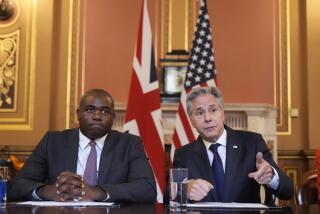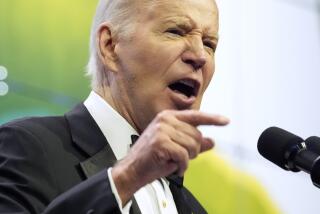Moscow to Press On With Reactor Sales to Iran : Trade: Russians insist lucrative deals won’t help Tehran produce nuclear arms. U.S. officials have urged cancellation.
- Share via
MOSCOW — Bristling at criticism from Washington and at home, Russian officials vowed Thursday to go ahead with sales of atomic reactors to Iran and insisted that the lucrative hard-currency transactions will not help the Iranians develop nuclear weapons.
Since it was signed last month, Moscow’s initial $800-million contract with Iran has become a new test of U.S.-Russian relations, already strained by the Russian military assault on the breakaway republic of Chechnya.
Atomic Energy Minister Viktor N. Mikhailov, the Russian who signed the deal, offered his most detailed defense of it Thursday after official nuclear and environmental monitors in Moscow echoed the Clinton Administration’s alarm that Russia might help Iran become a nuclear power.
Under the contract, signed Jan. 8, Russia will provide specialists, equipment and technology to help Iran finish a 1,300-megawatt light-water reactor--a West German project halted by Iran’s 1979 Islamic revolution.
Mikhailov said Russia expected to build three similar facilities at Bushehr, the same Persian Gulf location, for $2.2 billion more.
Secretary of State Warren Christopher warned that Iran is “engaged in a crash effort to develop nuclear weapons” and pressed Russian Foreign Minister Andrei V. Kozyrev to cancel the contract at a meeting last month in Geneva.
Undersecretary of State Lynn Davis made the point in a meeting Wednesday in Washington with Russian Deputy Foreign Minister Georgy Mamedov, and Deputy Secretary of State Strobe Talbott repeated it to Mamedov on Thursday. House Speaker Newt Gingrich and other senior Republicans have called for cutting off U.S. aid to Russia if the project goes ahead, but the Russians have not budged.
Speaking to reporters after a Cabinet meeting, Mikhailov made it clear that Russia values its commercial contracts at least as much as American aid.
He said Russia feels free to offer Iran nuclear technology because Tehran allows inspections by the International Atomic Energy Agency and complies with the other terms of the Nuclear Non-Proliferation Treaty.
“I do not see any reason why Russia should give up these contracts, the more so that Iran pays in convertible currency,” Mikhailov said. “No credits on our part are required.”
By contrast, he said, dealing with Washington is unprofitable.
The Atomic Energy Ministry has received $215 million in U.S. aid to help Russia dismantle its own nuclear weapons but has lost $450 million in potential sales of uranium to the American market because of U.S. anti-dumping restrictions.
Russia’s deal with Iran is a high-stakes issue all around.
Russia’s budget is stretched to the point of political instability. Iran, its energy complex damaged by its 1980-88 war with Iraq, cannot produce enough power for a booming population. The United States fears the supply of anything nuclear to an Islamic fundamentalist state hostile to its Mideast peace efforts.
A deal of similar import to Russia, the sale of $350 million in space rocket engines to India, was squashed in 1993 after the Administration, fearing India’s development of a ballistic missile system, threatened to cancel joint U.S.-Russian space projects.
*
Echoing a theme often sounded by Russian officials, Mikhailov suggested Thursday that Russia’s former Cold War enemy is less a strategic partner these days than a competitor whose policies are driven by commercial greed.
“If Russia refuses to build reactors in Iran,” he said, “then the United States will come along with its (Western) partners to build the same nuclear industry there.”
Mikhail Demurin, a Russian Foreign Ministry spokesman, noted that the reactor to be built for Iran is of the same type as the Administration approved for North Korea in return for Pyongyang’s renewed commitment to the non-proliferation treaty.
“It poses no threat whatsoever from the viewpoint of the creation of a weapons-grade potential,” he said.
Russian officials said plutonium waste produced by the light-water reactor can be upgraded for use in weapons only through radiological and chemical technologies that Iran lacks.
But opposition to the deal came this week from Yuri Vishnevsky, head of the Russian government’s nuclear watchdog agency, Gosatomnadzor.
Vishnevsky said there is nothing to stop Iran from getting its plutonium waste turned into weapons-grade fuel by a capable foreign source, then quitting the non-proliferation treaty and barring outside monitors.
U.S. officials make the same argument, warning Russia that it risks losing congressional support for billions of dollars in American aid.
But senior Iranian officials express confidence that Russia will resist U.S. pressure and follow through out of a desperate need for foreign currency and oil.
Boudreaux reported from Moscow and Wright, who was recently in Iran, reported from Washington. Times staff writer Norman Kempster in Washington also contributed to this report.
More to Read
Sign up for Essential California
The most important California stories and recommendations in your inbox every morning.
You may occasionally receive promotional content from the Los Angeles Times.










